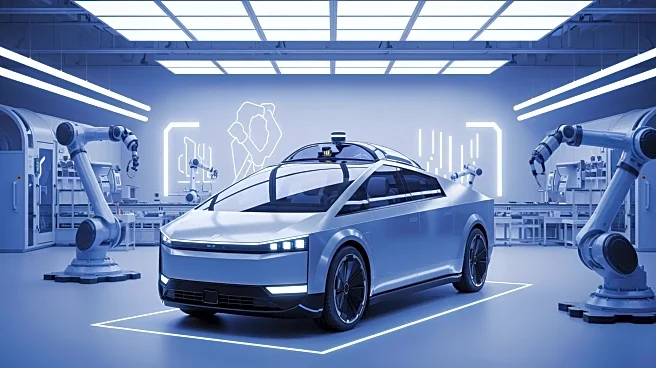What's Happening?
Tesla's Chief Executive Elon Musk has announced that the production of the company's autonomous taxi, the Cybercab, is scheduled to begin in April 2026 at Gigafactory Texas. This announcement was made
during Tesla's annual shareholders meeting. The Cybercab is a two-door autonomous vehicle, which marks a shift from Tesla's current robotaxi operations that utilize lightly customized Model Ys. The concept of the Cybercab was first unveiled in October 2024, and it represents Tesla's continued innovation in autonomous vehicle technology.
Why It's Important?
The introduction of the Cybercab into mass production signifies a major advancement in autonomous vehicle technology and could potentially reshape urban transportation. Tesla's move to produce a dedicated autonomous taxi model could enhance the efficiency and appeal of robotaxi services, offering a glimpse into the future of mobility. This development is likely to impact the automotive industry by setting new standards for autonomous vehicles and could influence public policy regarding transportation and urban planning. Stakeholders in the automotive and tech industries may benefit from increased demand for autonomous vehicle technology and infrastructure.
What's Next?
As Tesla prepares for the mass production of the Cybercab, industry observers will be watching for further details on the vehicle's specifications, pricing, and market strategy. The success of the Cybercab could prompt other automakers to accelerate their own autonomous vehicle projects. Additionally, regulatory bodies may need to address new challenges related to the deployment of autonomous taxis, including safety standards and insurance requirements. The development of infrastructure to support autonomous vehicles, such as charging stations and dedicated lanes, may also become a priority.
Beyond the Headlines
The production of the Cybercab could have broader implications for environmental sustainability, as autonomous electric taxis could reduce emissions and traffic congestion in urban areas. Furthermore, the shift towards autonomous vehicles may raise ethical and legal questions regarding data privacy and the impact on employment in the transportation sector. As autonomous technology becomes more prevalent, society will need to address these complex issues to ensure a balanced and equitable transition.











